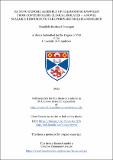De novo genome assembly of Plasmodium knowlesi from contemporary clinical isolates - a novel scalable resource to take forward malaria research
View/
Date
17/06/2022Author
Funder
Grant ID
204821/Z/16/Z
105621/Z/14/Z
G0801971
T16/03
Keywords
Metadata
Show full item recordAbstract
Plasmodium knowlesi is a zoonotic malaria parasite of Southeastern macaque monkeys that causes zoonotic malaria in humans. P. knowlesi is also an experimental model for malaria, and information on P. knowlesi largely stem from experimental lines first isolated >four decades ago, rather than contemporary isolates causing human infections. The experimental lines are laboratory-restricted and have become relatively genetically stagnant and free from the selection pressure that would naturally occur in nature. Within the P. knowlesi genome exist the Schizont Infected Cell Agglutination variant antigen (SICAvar) and Plasmodium knowlesi interspersed repeat (kir) multigene families significant, which are of biological and scientific interest. To provide context using contemporary clinical isolates, this project aimed to generate high-quality genome sequences using long-sequencing from clinical ‘wild-type’ samples from infected patients. This includes generating new information on variant multigene families in P. knowlesi genomes generated from clinical patient whole blood. The work presented here details a method to deplete leucocytes in thawed P. knowlesi-infected patient whole blood samples to generate parasite-enriched DNA for whole-genome sequencing, resulting in >95% human DNA reduction. The extracted DNA was sequenced with long-read sequencing technology to create de novo whole-genome assemblies. From these, two isolate genomes representing the two dimorphic clusters of P. knowlesi in clinical samples were analysed. The generated genomes are highly syntenic to the published reference genome, sharing >4500 orthologous clusters with the PKNH reference genome. However, the number of SICAvar and kir genes present in the dataset deviated from the published reference genomes of P. knowlesi. The successful generation and construction of these patient genomes aid further interrogation of the contemporary P. knowlesi genome, with a focus on the constituent genes present in comparison to the experimental line.
Type
Thesis, PhD Doctor of Philosophy
Rights
Creative Commons Attribution-NonCommercial-NoDerivatives 4.0 International
http://creativecommons.org/licenses/by-nc-nd/4.0/
Collections
Description of related resources
De novo genome assembly of Plasmodium knowlesi from contemporary clinical isolates - a novel scalable resource to take forward malaria research (thesis data), Oresegun, D. R., University of St Andrews, 02 November 2023. DOI: https://doi.org/10.17630/541e495e-231a-4c43-bd02-904bc3fd6f79Oresegun, D. R., Daneshvar, C., & Cox-Singh, J. (2021). Plasmodium knowlesi – clinical isolate genome sequencing to inform translational same-species model system for severe malaria. Frontiers in Cellular and Infection Microbiology, 11, Article 607686. https://doi.org/10.3389/fcimb.2021.607686
Oresegun, D. R., Thorpe, P., Benavente, E. D., Campino, S., Fauzi, M., Moon, R. W., Clark, T. G., & Cox-Singh, J. (2022). De novo assembly of Plasmodium knowlesi genomes from clinical samples explain the counterintuitive intrachromosomal organization of variant SICAvar and kir multiple gene family members. Frontiers in Genetics, 13, Article 855052. https://doi.org/10.3389/fgene.2022.855052
Except where otherwise noted within the work, this item's licence for re-use is described as Creative Commons Attribution-NonCommercial-NoDerivatives 4.0 International
Items in the St Andrews Research Repository are protected by copyright, with all rights reserved, unless otherwise indicated.


